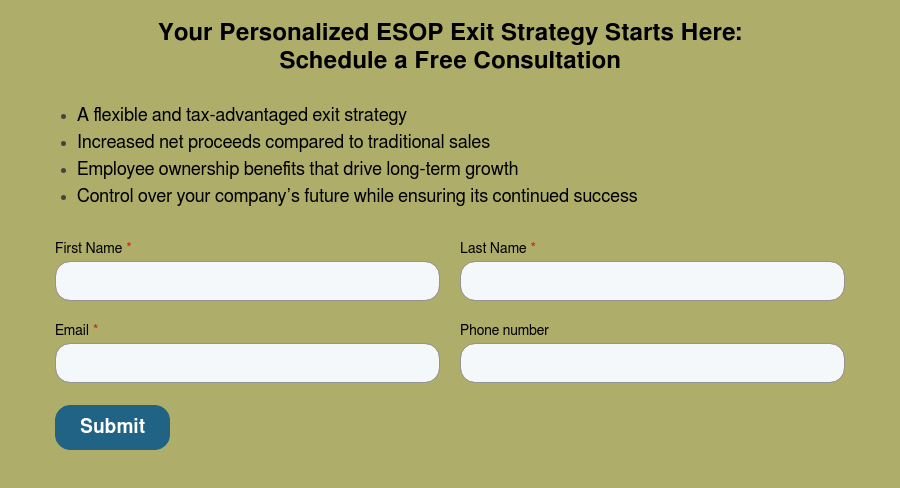Industry Trends
Largest Transactions Closed
- Target
- Buyer
- Value($mm)
Last updated:
Thinking about selling your company to an employee stock ownership plan (ESOP)? Among the many good reasons to give your employees partial or full ownership of your company through shares of stock they don’t have to purchase themselves is that they’ll be more motivated to ensure your company succeeds—because they have skin in the game.
Despite the numerous benefits of ESOPs, which are especially advantageous in the current economic climate, this kind of sale isn’t a good fit for every company (for example, if you’re looking for an immediate exit from the business, it might not be your best option). If you're unfamiliar with how an ESOP works, start with our guide on what an ESOP is. Before selling all or part of your business to an ESOP, you’ll want to consider the following five factors.
If your company has earnings before interest, taxes, depreciation, and amortization (EBITDA)—a proxy for cash flow—below $1 million, an ESOP is probably not a good fit. To evaluate whether your company meets the financial criteria, consider conducting an ESOP feasibility study. That threshold ensures that the eventual payments to retiring employees will be enough to create a meaningful benefit to incentivize employees without becoming an albatross around your company’s neck.
If your EBITDA is less than $1 million but you can make a good case for increased financial performance in the future—perhaps you have a new customer or a solid product backlog that is not evident in the historical financial statements—an ESOP may be worth exploring.
Besides meeting the EBITDA threshold, your company should be big enough to provide the financial and administrative resources needed to establish and maintain an ESOP—a good HR rep and accounting team are essential. Companies with fewer than 20 employees are typically dissuaded from installing an ESOP, as the lack of diversification in the employee base can lead to an unsustainable repurchase obligation.
An ESOP also may not be a good fit if your company has choppy revenues—apart from any inconsistencies stemming from the COVID-19 pandemic or the economic downturn in 2008. Concerns arise when the financials seed doubts about your company’s future earnings potential or the efficacy of its management. Weak performance in both areas would negatively impact the retirement savings of any employees who participate in the plan.
ESOPs are designed to be an investment for employees, which makes them a good fit for a company that has long-term growth potential. The ESOP trust will be investing in your company’s stock with the expectation that the stock’s value will increase over time. If your company has limited growth potential, the stock’s value may not increase significantly, which defeats the purpose of having the benefit in the first place. Likely future performance is key; if your company is not currently in a strong position to sell to an ESOP but has strong growth potential, such a sale in the not-too-distant future may be viable.
A strong management team is important for any company, but especially so for a company with an ESOP. The management team will be responsible for making decisions that affect the value of your company’s stock, which will directly impact the retirement savings of any employees who participate in the plan. A strong management team can help ensure that your company is making decisions that are in its own best interests and those of your employees.
In turn, an ESOP, by incentivizing current employees and external hires, can help ensure continuity in competent decision-making long after the existing management team is gone.
An ESOP transaction will require adding debt to your company’s balance sheet, usually through bank financing or seller debt. Learn more about your options for financing a sale to an ESOP to ensure a successful transaction. Too much leverage (i.e., the amount of debt relative to the company’s cash flows) will forestall an ESOP transaction. The amount of leverage a company can take on varies by industry and other factors, including any future borrowings you might need to run the business (e.g., loans for capital expenditures or inventory). Beyond a certain point, banks will hesitate to continue lending to your company because they, like you, need to manage their risks and returns. Of course, you always have the option of selling less than 100% of your company to the ESOP, which may make the risk profile more palatable to lenders. Proper ESOP structuring can help balance risk while maximizing benefits for both owners and employees.
ESOPs can provide a number of benefits to both employees and companies, but you’ll need to carefully consider whether an ESOP is the right choice for your business before moving forward. At PCE, we have closed over $3 billion in ESOP transactions, every one of them carefully planned and weighed against other options. Understanding the ESOP transaction process can help business owners navigate the complexities of an ESOP sale. An ESOP will be a good fit if your company’s EBITDA is more than $1 million, its financial performance is largely stable and predictable, its long-term growth outlook is good, and its management team is strong. You’ll also want to ensure that the amount needed for the ESOP transaction won’t leverage your company too heavily.
If you’re considering whether an ESOP is right for your company, PCE can help. Contact us today. Additionally, finding the right ESOP advisor can be crucial to a smooth and successful transition.
Selling your business is a major decision—why not choose a strategy that maximizes your proceeds, minimizes taxes, and secures your legacy?
Fill out the form below to contact our expert ESOP advisors today. Let’s discuss if an ESOP is right for you.

Investment Banking | ESOP
Orlando Office
407-621-2124 (direct)
wstewart@pcecompanies.com
Connect
407-621-2124 (direct)
407-621-2199 (fax)
